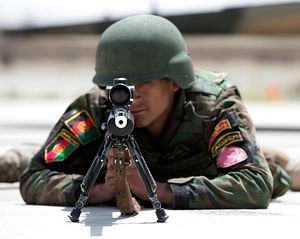By Mike Corder
 Appeals judges at the International Criminal Court gave the green light Thursday for prosecutors to open an investigation targeting the Taliban, Afghan forces, and U.S. military and CIA personnel for war crimes and crimes against humanity.
Appeals judges at the International Criminal Court gave the green light Thursday for prosecutors to open an investigation targeting the Taliban, Afghan forces, and U.S. military and CIA personnel for war crimes and crimes against humanity.
The decision marked the first time the court’s prosecutor has been authorized to investigate U.S. forces. Washington has long rejected the court’s jurisdiction and refuses to cooperate with it.
In 2018, then-U.S. National Security Adviser John Bolton said the court established in 2002 to prosecute atrocities throughout the world “unacceptably threatens American sovereignty and U.S. national security interests.”
The global court set itself on a collision course with Washington with Thursday’s decision to uphold an appeal by prosecutors against a pretrial chamber’s rejection in April last year of Prosecutor Fatou Bensouda’s request to open a probe in Afghanistan.
Pretrial judges last year acknowledged that widespread crimes have been committed in Afghanistan, but rejected the investigation saying it wouldn’t be in the interests of justice because the expected lack of cooperation meant convictions would ultimately be unlikely.
That decision drew fierce criticism from human rights organizations who said it neglected the desire of victims to see justice in Afghanistan and effectively rewarded states that refused to cooperate with the Hague-based court.
Even though an investigation has now been authorized, it remains to be seen if any suspects eventually indicted by prosecutors will appear in court in The Hague — both Afghanistan and the United States have strongly opposed the investigation and the U.S. government refuses to cooperate with the global court.
Rights groups, however, applauded the decision.
“The ICC Appeals Chamber’s decision to green light an investigation of brutal crimes in Afghanistan despite extreme pressure on the court’s independence reaffirms the court’s essential role for victims when all other doors to justice are closed,” said Param-Preet Singh, associate international justice director at Human Rights Watch.
She added that the decision “also sends a much-needed signal to current and would-be perpetrators of atrocities that justice may one day catch up to them.”
At a hearing in December, prosecutors argued that pretrial judges at the global court overstepped their powers in April last year when they refused to authorize an investigation. The appeals judges agreed.
“The Appeals Chamber considers it appropriate to amend the appealed decision to the effect that the prosecutor is authorized to commence an investigation into alleged crimes committed on the territory of Afghanistan since May 1, 2003, as well as other alleged crimes that have a nexus to the armed conflict in Afghanistan,” Presiding Judge Piotr Hofmanski said.
After a preliminary probe in Afghanistan that lasted more than a decade, Bensouda asked judges in November 2017 to authorize a far-reaching investigation.
She said there is information that members of the U.S. military and intelligence agencies “committed acts of torture, cruel treatment, outrages upon personal dignity, rape and sexual violence against conflict-related detainees in Afghanistan and other locations, principally in the 2003-2004 period.”
Katherine Gallagher, senior staff attorney at the Center for Constitutional Rights, who represents a group of victims of U.S. detention program, said the decision “breathed new life into the mantra that ‘no one is above the law’ and restored some hope that justice can be available—and applied — to all.”
Gallagher represented two men still being held in U.S. detention at Guantanamo Bay, Sharqawi Al-Hajj and Guled Duran, and the wife of a third man who has died.
Bensouda also said in her request to open an investigation that the Taliban and other insurgent groups have killed more than 17,000 Afghan civilians since 2009, including some 7,000 targeted killings, and that Afghan security forces are suspected of torturing prisoners at government detention centers.
Thursday’s ruling comes days after an ambitious peace deal was signed by the United States and the Taliban.
At a December hearing, the government of Afghanistan said it objected to the investigation and has set up a special unit to investigate war crimes. The ICC is a court of last resort that only takes on cases if domestic jurisdictions are unable or unwilling to prosecute.
There was no official U.S. delegation at December’s appeal hearing, but President Donald Trump’s personal lawyer, Jay Sekulow, appeared on behalf of the European branch of the American Center for Law and Justice and told judges that the U.S. position wouldn’t change.
He told appeals judges that “it is not in the interests of justice to waste the court’s resources while ignoring the reality of principled non-cooperation.”
In a speech in 2018 on the eve of the anniversary of the 9/11 attacks, Bolton said the U.S. would use “any means necessary” to protect Americans and citizens of allied countries, like Israel, “from unjust prosecution by this illegitimate court.” The White House said that to the extent permitted by U.S. law, the Trump administration would ban ICC judges and prosecutors from entering the United States, sanction their funds in the U.S. financial system, and prosecute them in the U.S. criminal system.
“We will not cooperate with the ICC,” Bolton said, adding that “for all intents and purposes, the ICC is already dead to us.”
By Mike Corder for the Associated Press
No comments:
Post a Comment